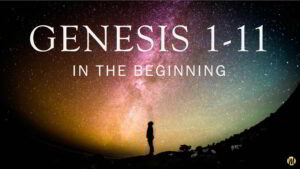 Genesis 1–11: God’s Design for Nationhood (Pt. 4/5)
Genesis 1–11: God’s Design for Nationhood (Pt. 4/5)
Category: Biblical Studies Old Testament
Genesis 1–11: God’s Design for Civilization (Pt. 3/5)
 Genesis 1–11: God’s Design for Civilization (Pt. 3/5) Creation Mandate
Genesis 1–11: God’s Design for Civilization (Pt. 3/5) Creation Mandate
God’s purpose for humanity is expressed in the Creation Mandate. Understood in context, it is to turn the rest of the earth outside Eden into Eden. It involves building a global civilization that is in fellowship with God and consistent with his will. After sin came into the world and humanity was driven out of Eden, the mandate could no longer be fulfilled as intended. The mandate was derailed but not defeated because God cannot be defeated. Through Christ the Creation Mandate is reclaimed so that it will be fulfilled as intended. This is seen in the Great Commission, which is about making disciples of all nations so that they observe everything Christ has commanded in every aspect of their life (a global civilization consistent with God’s will); and Christ is with disciples of all nations through the Spirit (a global civilization in fellowship with God). It is crucial to recognize that the Great Commission is the renewed Creation Mandate. For it means disciples of Christ cannot dichotomize the spiritual from the secular in any aspect of their life—a problem that has been plaguing modern Christianity.
You can view the full video at
Genesis 1–11: God’s Design for Civilisation (Pt. 3/5) Creation Mandate
Genesis 1–11: God’s Design for Personhood (Pt. 2/5)
 Genesis 1–11: God’s Design for Personhood (Pt. 2/5)
Genesis 1–11: God’s Design for Personhood (Pt. 2/5)
God created humanity “in his image.” The meaning of “the image of God” matters; it is our identity as human beings. Today there is a tendency in OT scholarship to confuse the purpose for being made in God’s image with the meaning of being made in God’s image. This video gets beneath the English translation and concludes that to be made in God’s image is to be like God in some ways—in terms of humanity’s God-like nature of personhood, qualities of love and justice, and abilities to communicate and create. All this is so that humanity could fulfill God’s purpose for them. Persons can think, reason and make decisions; God’s design for personhood is for humanity to think, reason and make decisions in a way not independent of God and his will. Humanity began to deviate from this design when Adam and Eve ate from the tree of the knowledge of good and evil. To appreciate why in modern civilization humanity is on a path to self-destruction we need to return to what happened in the garden of Eden.
The Uncanny Superiority of Ecclesiastes over Its Counterparts (Ecclesiastes 5/5)
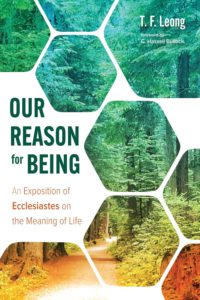 The Uncanny Superiority of Ecclesiastes over Its Counterparts
The Uncanny Superiority of Ecclesiastes over Its Counterparts
Kairos Podcast 7: Ecclesiastes and the Human Quest for Meaning (5/5)
Ecclesiastes is a speech “framed” by third-person references to the speaker, including a description of him and his teaching. In this description it is explicitly claimed that the speech is Scripture inspired by God. However, recent commentaries by even Evangelical scholars assume pessimism and contradictions in the speech. How then can it be Scripture inspired by God? The first video indicated that the supposed pessimism and contradictions in the speech are only apparent, not real. This final video seeks to corroborate the explicit claim that the speech is Scripture inspired by God by showing that the wisdom of Ecclesiastes is uncannily superior to that of its non-biblical counterparts.
Perceiving Coherence in Life Despite Undeserved Suffering (Ecclesiastes 4/5)
 Perceiving Coherence in Life Despite Undeserved Suffering
Perceiving Coherence in Life Despite Undeserved Suffering
Kairos Podcast 7: Ecclesiastes and the Human Quest for Meaning (4/5)
Discovering the Most Worthwhile Purpose for Living ( Ecclesiastes 3/5)
 Discovering the Most Worthwhile Purpose for Living ( Ecclesiastes 3/5)
Discovering the Most Worthwhile Purpose for Living ( Ecclesiastes 3/5)
Kairos Podcast 7: Ecclesiastes and the Human Quest for Meaning (3/5)
There are two conditions for experiencing the meaning of life. This video discusses the first, revealed in Ecclesiastes as living out God’s purpose for humanity. This condition is corroborated empirically by real-life human experience in a recent PhD thesis. One need not be a Christian to discover and live out this purpose and experience the meaning of life. However, Ecclesiastes also reveals that God will one day judge every person based on this purpose. Because of sin, no one can live out this purpose perfectly and so everyone needs God’s forgiveness. Hence Ecclesiastes points non-Christians to Christ no matter how meaningful their life may be.
Biblical Dualism and the Soul Between Death and Resurrection (the Intermediate State)
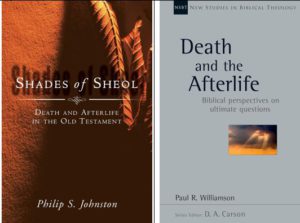 Death, Resurrection and Life Everlasting DRLE Pt.2
Death, Resurrection and Life Everlasting DRLE Pt.2
Death involves disintegration of a person’s vital power, cessation of bodily life, and separation of the body and the soul (nepeš): Gen. 35:18; 1 Kings 19:4). Does the soul continue to exist after the death of the person? The monist theologian’s answer is “no”. Monism argues that according to the Bible, a human being is not divided into separate parts, i.e. body, soul, and spirit, but he exists as a unified or holistic self. Since the soul and the body are just different aspects of a person, existence entails bodily existence. There is no possibility of disembodied existence of the soul after death. The purpose of this post is to show that monism contradicts the Bible which ascribes to the disembodied soul some forms of consciousness in the intermediate state between death and final resurrection.1This post focuses on the biblical teaching on the soul’s disembodied existence in the intermediate state. For a philosophical defence of the tenability of disembodied existence of the soul, see Paul Helm, “A Theory of Disembodied Survival and Re-embodied Existence,” Religious Studies (1978), pp. 15-26; Richard Purtill, “Disembodied Survival,” Sophia 12 (1973), pp. 1-10. Continue reading “Biblical Dualism and the Soul Between Death and Resurrection (the Intermediate State)”
Enjoying the Best of Both Worlds—This and the Next (Ecclesiastes 2/5)
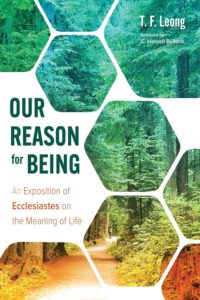
Enjoying the Best of Both Worlds—This and the Next (Ecclesiastes 2/5)
Kairos Podcast 7: Ecclesiastes and the Human Quest for Meaning 2/5
Only two out of thirty over English translations of the Bible render the theme of Ecclesiastes as “Everything is meaningless.” Most translations retain the traditional rendering “All is vanity.” Yet most Christians today assume that Ecclesiastes says, “Everything is meaningless.” Since this robs Ecclesiastes of its God-inspired message, this video seeks to defend the traditional rendering. It shows that “All is vanity” is an objective description of reality whereas “Everything is meaningless” is a pessimistic response to that reality. Ecclesiastes itself teaches a realistic response. The Gospel empowers Christians to also have an optimistic response. Hence they can enjoy the best of both worlds—this and the next.
You can watch the full video at
Kairos Podcast 7: Ecclesiastes and the Human Quest for Meaning 2/5
Everything Is Not Meaningless (Ecclesiastes 1/5)
 Everything Is Not Meaningless (Ecclesiastes 1/5)
Everything Is Not Meaningless (Ecclesiastes 1/5)
Kairos Podcast 7: Ecclesiastes and the Human Quest for Meaning (1/5)
1) Ecclesiastes is about the human quest for meaning. This quest became pronounced in the 20th century and even more so in the 21st century. Hence Ecclesiastes is needed today more than ever. However, the message is presented in a way so unique that it is often misunderstood. Most biblical scholars see pessimism and contradictions in the book. This has undermined the authority of Ecclesiastes as Scripture inspired by God.
This is the first in a series of five videos which seeks to reclaim the authoritative message of Ecclesiastes. This video introduces the series as well as seeks to remove the immediate obstacles to accepting Ecclesiastes as authoritative Scripture—apparent pessimism and apparent contradictions. It shows that the theme of Ecclesiastes is realistic, not pessimistic, and that the supposed contradictions are indeed apparent, not real.
You may read and comment on the video at
Everything Is Not Meaningless (Ecclesiastes 1/5)
Genesis 1:1 – The Correct Translation: “In the beginning, God Created the Heavens and the Earth” (KJV, ESV, NIV) vs “In the Beginning when God Created the Heavens and the Earth (NRSV, JPS).”
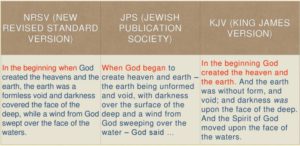 The standard translation takes Gen.1:1 to be an independent clause which refers to the absolute beginning of the universe: “In the beginning God created the heavens and the earth.” The word bərēʾšît (beginning) denotes the start of a whole sequence of events, that is, the absolute beginning of “the heavens and the earth.” The phrase is a rhetorical device (merism) which combines two extremes in order to refer to everything in between them. The translation is consistent with the idea that God created the whole universe ex nihilo.
The standard translation takes Gen.1:1 to be an independent clause which refers to the absolute beginning of the universe: “In the beginning God created the heavens and the earth.” The word bərēʾšît (beginning) denotes the start of a whole sequence of events, that is, the absolute beginning of “the heavens and the earth.” The phrase is a rhetorical device (merism) which combines two extremes in order to refer to everything in between them. The translation is consistent with the idea that God created the whole universe ex nihilo.
The NET Bible supports the traditional scholarship in its translators’ notes on Gen. 1:1 – “the translation assumes that the form translated “beginning” is in the absolute state rather than the construct (“in the beginning of,” or “when God created”). In other words, the clause in v. 1 is a main clause, v. 2 has three clauses that are descriptive and supply background information, and v. 3 begins the narrative sequence proper.”
This traditional interpretation has been dominant for centuries. However, it has recently been seriously challenged by scholars who are informed by historical criticism of the Pentateuch which began in the 19th century. Continue reading “Genesis 1:1 – The Correct Translation: “In the beginning, God Created the Heavens and the Earth” (KJV, ESV, NIV) vs “In the Beginning when God Created the Heavens and the Earth (NRSV, JPS).””